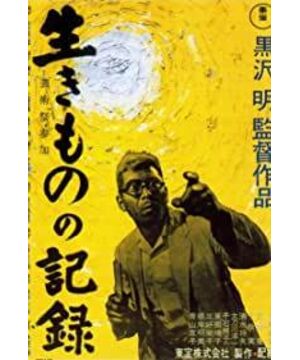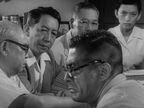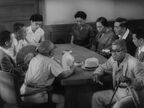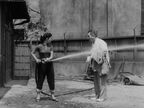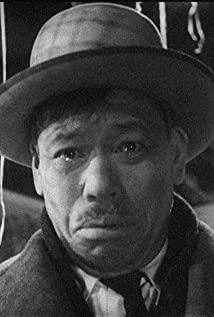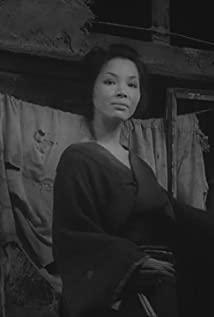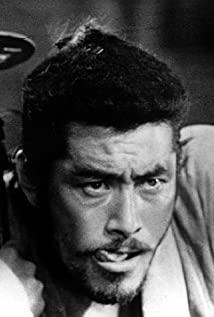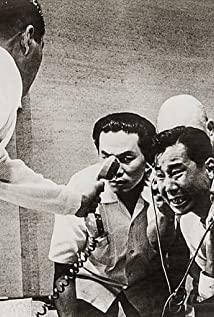At first glance, I was ignorant. I thought that the old man's fear of radiation was the aftermath of the two that were thrown in Hiroshima and Nagasaki 10 years ago. Later, I learned that it was a hydrogen bomb, so I went to check the information. It turned out that the United States experimented with a hydrogen bomb in the Marshall Islands at the time of the filming, which also caused the death of the Japanese crew passing through here. The writing of "Dead Ash" that appeared in the film is exactly this. So, this is not a social allegory kind of movie, but a description of real events. So is this a story about boiling frogs in warm water?
My nerves were touched as the story went on. The old man later gathered his whole family, including the wife's children. The daughter pulls out the album to show her half-sister. The people in the factory traveled together, and the people in the photo were very happy, including the youngest daughter. My mother suddenly said, "I was really happy that time. At that time, I thought that I would be too happy and would be punished. I have been trembling since then, but now it seems that I have agreed." At this point, I feel that this is talking about war. Although this analogy is indeed a bit crazy, but because I think of many movies with the same theme, such as "Tokyo Story", such as "Blood and Bone". For most ordinary Japanese, that terrible war was actually a sudden catastrophe. Before the massive bombing by the US military and the detonation of nuclear bombs, during the terrible war that lasted for several years, ordinary Japanese people were still living very ordinary lives. Just like the people in the movie, everyone was wondering whether to immigrate to the new colony, where I heard there were plenty of opportunities. No matter how many people were sent out in uniform, the atmosphere of the war was mainly joyous. Although the newspapers are full of various wars, they are mostly descriptions of events that are neither painful nor itchy. There will be no massacres, no defeats, and no corpses. Especially when the Japanese army occupied Nanjing, the capital of China, the whole of Japan cheered, and they did not know the massacre that followed. (As the old mother said, the day in the photo) Everyone feels that the war is over, China has surrendered, the children and soldiers can come back, and peaceful days are about to begin.
Until one day, flames lit up the sky like the sun, and the atomic bomb exploded. People just woke up like a dream, and Japan was defeated. So, from the Japanese point of view, they can't understand the war, what they can understand is that every day of hard work is suddenly met with misfortune. This concept of victimhood is rooted in their hearts, and the Asahi Shimbun held a big discussion after the war, and people all over the country wanted to speak out about their fears. Akira Kurosawa reproduced this mentality in this way.
But what I want to ask is, do you really have no idea what you all do? When the U.S. military liberated the concentration camps, every German was asked to go to the concentration camps to transport and bury their bodies, so that they could see for themselves what they had done. These people live near the concentration camps every day, they can see the black smoke from burning corpses in the chimneys and the "dead ashes" floating in, and they can smell the stench of tens of thousands of prisoners. But they said they didn't know it was a concentration camp until the U.S. military forced them to see it, which the U.S. military didn't do to the Japanese.
So, Japan is the victim. Akira Kurosawa did not give a sympathetic word like Yasujiro Ozu: "Life must go on". He didn't focus on what I said about war. He was talking about anti-nuclear, and in the end, it will also fall on anti-nuclear. It is the nuclear bomb that caused all this. The nuclear bomb will destroy human beings. The elderly will exit down the stairs, and young mothers and children will appear on the stairs. I hope the next generation can think about this problem and never make the same mistakes.
What is wrong? Invading others and provoking war?
Still no nukes.
I hope I'm right, but most likely not.
View more about I Live in Fear reviews


